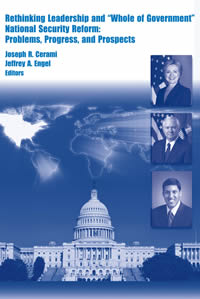Rethinking Leadership and "Whole of Government" National Security Reform: Problems, Progress, and Prospects

Edited by Dr. Joseph R. Cerami, Dr. Jeffrey A. Engel.
June 2010
232 Pages
Brief Synopsis
The authors in this book share the viewpoint of many in the international and public affairs communities--that our theories, concepts, and practices for understanding America's role in the world and the U.S. ability to implement effective and ethical national security policies do not seem to be working very well. Is a new era of reform needed for this new age? Can we offer concrete and theoretical suggetions to reform the U.S. national security system to meet 21st century threats? Do we also know how to develop the kind of effective and ethical leaders who can make such reforms work? These papers explore the need for whole of government, national security reform and, simultaneously, the need to include further emphasis on leadership and leader development, in particular, in such areas as economics, information sharing, and ethics. No thoughtful observer disputes the need for some reform of the national security apparatus to improve the capacity for improving the government's performance. Yet, by and large, America's post-September 11, 2001, security agencies and institutions retain their Cold War design. The 1947 National Security Act remains, even after the end of the Cold War, now more than 20 years ago, the defining charter of the nation's security system. The chapter authors offer practical and theoretical suggestions for reforming the nation's security needs to address its 21st century threats, while simultaneously developing the kind of effective and ethical leaders necessary to create a 21st century national security system.
Contents
Foreword
1. Will What We Think We Know About Leadership and “Whole of Government” Reform Kill the Prospects for Effective and Ethical Change?
Joseph R. Cerami
2. Leadership, National Security, and Whole of Government Reforms: The Project on National Security Reform (PNSR) Perspective
James R. Locher III
3. Leadership as Practical Ethics
Joel H. Rosenthal
4. Transforming Intelligence Analysis: “The Tail That Wags the Dog”
Richard H. Immerman
5. Reforming the National Security Process in a Globalizing World
James Goldgeier
6. A Fine Balance: The Evolution of the National Security Adviser
Andrew Preston
7. Leading the Next Phase of Homeland Security Intelligence: Providing Better Definitions, Roles, and Protections
Geoffrey S. French
8. Winning Hearts and Minds: From Slogan to Leadership Strategy
Todd L. Pittinsky
9. Change Is Hard . . . But Even Small Steps Matter
Jeffrey A. Engel
About the Contributors
The George Bush School of Government and Public Service, Texas A&M University
The Scowcroft Institute of International Affair
About the Strategic Studies Institute
Access Full Report [PDF]: Rethinking Leadership and "Whole of Government" National Security Reform: Problems, Progress, and Prospects
|
NEWSLETTER
|
| Join the GlobalSecurity.org mailing list |
|
|
|

